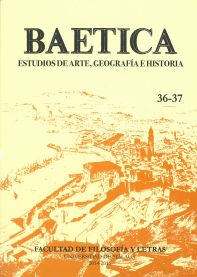Si dio a usura pública o secretamente: Approximation to the usury in the handbook for Confessors of the late medieval Castile
DOI:
https://doi.org/10.24310/BAETICA.2015.v0i36-37.197Keywords:
handbook for Confessors, usury, loan, sale, rentalAbstract
The handbooks for Confessors have got great value for historians, since they reveal the most common behaviours in medieval society. In the field of economy, these books devote considerable space to the problem of usury. This concept goes beyond the loan at an interes rate (public usury) and includes several deals which hid public usury under different appereances (hidden usury). This was made through frauds in the loans, resale of products or the rental. In this article we will study the handbooks which were present in medieval Castile.Downloads
Metrics
References
BLANCO, Susana; CARVAJAL, Pedro (2001), Prácticas financieras medievales. El caso castellano, Universidad Rey Juan Carlos, Madrid.
BARILE, Nicola Lorenzo (2010), “Credito, usura, prestito a interesse”, Reti Medievali, XI (2010/1), pp. 475-505.
BORRERO FERNÁNDEZ, Mercedes (1986), “Efectos del cambio económico en el ámbito rural: Los sistemas de crédito en el campo sevillano (fines del siglo XV y principios del XVI)”, En la España medieval, 8, pp. 219-244.
BORRERO FERNÁNDEZ, Mercedes (1991), “Crisis de cereales y alzas de los precios en la Sevilla de la primera mitad del siglo XVI”, Historia. Instituciones. Documentos, 18, pp. 39-56.
CANGA ARGÜELLES, José (1834), Diccionario de Hacienda con aplicación a España, tomo II, Madrid.
CARVAJAL, David (2012), “Instrumentos financieros en Castilla a fines de la Edad Media e inicios de la Moderna”, en E. García e I. Vítores (eds.), Tesoreros arrendadores y financieros en los reinos hispánicos, Instituto de Estudios Fiscales, Madrid, pp. 79-99.
CORONA GONZÁLEZ, Santos M. (1992), Ilustración y derecho. Los fiscales del Consejo de Castilla en el siglo XVIII, Ministerio para las Administraciones Públicas, Madrid.
GARCÍA MANSILLA, Juan V. (2002), Vivir a crédito en la Valencia medieval. De los orígenes del sistema censal al endeudamiento del municipio, Univer-sitat de València, Valencia.
HERNANDO DELGADO, Josep (1981), “Realidades socioeconómicas en el Libro de las confesiones de Martín Pérez: usura, justo precio y profesión”, Acta historica et archaeologica mediaevalia, 2, pp. 93-106.
HERNANDO DELGADO, Josep (2000), “De la usura al interés: Crédito y ética en la Baja Edad Media”, en Aragón en la Edad Media. Sociedad, culturas e ideologías en la España bajomedieval. Sesiones de trabajo. Seminario de historia medieval, Universidad, Zaragoza, pp. 55-74.
LITTLE, Lester K. (1981) “Les techniques de la confession et la confession comme technique”, en Faire Croire: Modalités de la diffusion et de la récepción des messages religieux de XIIe au XVe siècle. Table Ronde organissé par l’Ecole Française de Rome, en collaboration avec l’Institut d’histoire médiévale de l’Université de Padoue (Rome, 22-23 juin, 1979), École Française de Rome, Roma, pp. 87-99.
PUCHADES I BATALLER, Ramon J. (1999), Als ulls de Déu, als ulls dels homes. Estereotips morals i percepció social d´algunes figures professionals en la societat medieval valenciana, Universitat de València, Valencia.
SCHUMPETER, Joseph A. (2012), Historia del análisis económico, Ariel, Barcelona.
TODESCHINI, Giacomo (2011), “Usury in Christian Middle Ages. A Reconsi- deration of the Historiographical Tradition (1949-2010)”, en Francesco Ammannati (ed.), Religione e istituzioni religiose nell’economia euro-pea, 1000-1800. Actas de la “quarantatreesima settimana di studi”, 8-12 de mayo de 2011, pp. 119-130.
TODESCHINI, Giacomo (2014), “Morale economica ed esclusione sociale nelle città di mercato europee alla fine del Medioevo (XIII-XV secolo)”, en Flocel Sabaté y Maite Pedrol (eds.), El mercat: un món de contactes i intercanvi. Actas del XVI Curs d’Estiu Comtat d’Urgell celebrado en Balaguer los días 6, 7 y 8 de julio de 2011, Lérida, pp. 43-56.
Downloads
Published
How to Cite
Issue
Section
License
This journal provides immediate free access to its content on the principle of making research freely available to the public. All content published in Baetica. Modern and Contemporary History Studies are subject to the Creative Commons Acknowledgment-NoCommercial-ShareAlike 4.0 license, the full text of which can be found at <http://creativecommons.org/licenses/by-nc-sa/4.0>
They may be copied, used, disseminated, transmitted and publicly displayed, provided that:
The authorship and the original source of its publication (magazine, publisher and URL of the work) must be cited.
They are not used for commercial purposes.
The existence and specifications of this use license are mentioned.
Copyrights are of two kinds: moral and patrimonial. Moral rights are perpetual, inalienable, non-transferable, inalienable, unattachable and imprescriptible prerogatives. In accordance with copyright legislation, BAETICA. Estudios de Historia Moderna y Contemporánea recognizes and respects the moral right of the authors, as well as the ownership of the patrimonial right, which will be transferred to the University of Malaga for its open access dissemination. Economic rights refer to the benefits obtained from the use or disclosure of works. BAETICS. Estudios de Historia Moderna y Contemporánea is published in open access and is exclusively authorized to carry out or authorize by any means the use, distribution, disclosure, reproduction, adaptation, translation or transformation of the work.
It is the responsibility of the authors to obtain the necessary permissions of the images that are subject to copyright.
Authors whose contributions are accepted for publication in this journal will retain the non-exclusive right to use their contributions for academic, research, and educational purposes, including self-archiving or deposit in open access repositories of any kind.
The electronic edition of this magazine is edited by the Editorial of the University of Malaga (UmaEditorial), being necessary to cite the source in any partial or total reproduction.







2.png)
